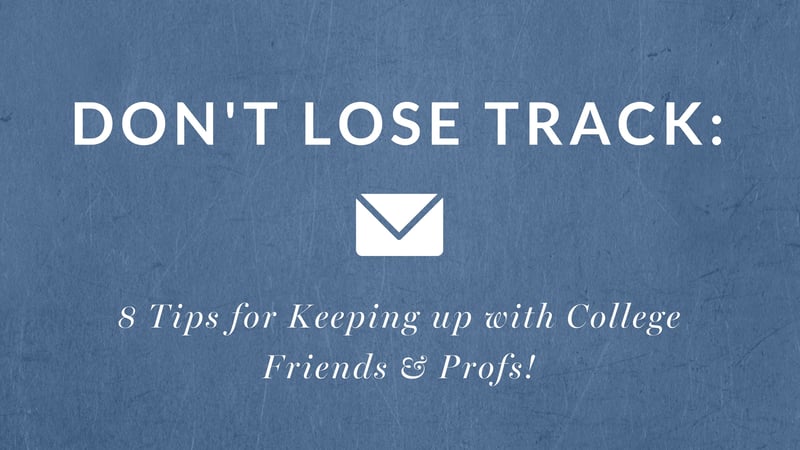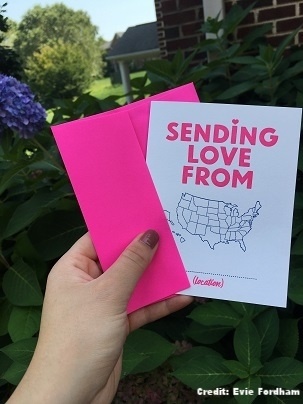
Graduation is over. You complete hours of packing up your dorm room for the last time. You hug people goodbye, promising to keep in touch. After all, in this age of social media, it should be easy to stay in touch with a friend or professor from your undergrad years—everything is just the click of a button away.
Yet, it is far too easy to lose track of time. Jobs, new friends, and hobbies fill up almost every hour in the day. It's time to get back in touch with the people who shaped your life for four years. We hope this blog post gives you a few tips for hanging on to the valuable relationships you formed during your college years.
College Friends
You shared so many laughs, late nights and deep talks with each other throughout your four years in college. Now you’re going your separate ways—in some cases, across the country from one another—and you want to make sure you do not lose track.
Here are a few ideas to be more intentional about staying in contact:
1. Go old school and write them a letter.
 Getting a letter in the mail can be so much more meaningful than a volley of Facebook messages, showing your friend how much you value them. Keeping up with important dates like birthdays can be a good impetus for you to send them a note, but don’t hesitate to write them “just because” either!
Getting a letter in the mail can be so much more meaningful than a volley of Facebook messages, showing your friend how much you value them. Keeping up with important dates like birthdays can be a good impetus for you to send them a note, but don’t hesitate to write them “just because” either!
You can find similar cards to the one on the right here.
Wondering what to write? Writing letters is a little bit out of the norm in most recent college grads’ daily routines. Remind your friend of some of your happiest times together, let them know how you are (new job? significant other? family news?), and ask them how they are doing. You could be starting a new tradition for your friendship!
2. Have a long-distance book club.
 You became friends because of your shared interests… don’t forget about them! And reading (while it is an interest of its own) can continue to bring you together over things you care about. Cooking, cars, historical fiction—the list is endless for how you and a friend or group of friends can customize the selections for your book club.
You became friends because of your shared interests… don’t forget about them! And reading (while it is an interest of its own) can continue to bring you together over things you care about. Cooking, cars, historical fiction—the list is endless for how you and a friend or group of friends can customize the selections for your book club.
Click here or here for a collection of diverse books you and your friends can dive into soon!
If you live in the same city, take turns hosting the meetings at your houses (and don’t forget about the snacks!). If you’re long distance, a monthly Skype call could do.
So once you have the book and meeting time figured out, how do you make sure you keep the discussion of the story going? Check out this list of questions that work for any book.
3. Just give them a call!
Have an hour-long commute that always drags by? Or bored while grocery shopping? Give your friend a ring! They will probably be more than happy to hear from you, even if you only chat for a few minutes. On the flip side, if your schedules are more regular, have a scheduled time to catch up over the phone, even if it's just a short call. Texts, emails, and even Snapchats can give you a glimpse into how your friend is doing, but nothing can beat hearing his or her voice.
4. Make a point to visit each other.
 You started out your friendship in the same little college town, but now you and your friends live states apart. Phone calls and texts can let you into their lives only so much, so plan a visit! Meet in the middle (this could be convenient if your old college stomping grounds is in a good location) or go see the area where your friend is now living and working.
You started out your friendship in the same little college town, but now you and your friends live states apart. Phone calls and texts can let you into their lives only so much, so plan a visit! Meet in the middle (this could be convenient if your old college stomping grounds is in a good location) or go see the area where your friend is now living and working.
If you’re a recent college grad, you probably have the most freedom and flexibility you will enjoy until retirement (sad but true!). So seize the day and plan a fun weekend (or week) with your college best friend.
Check out links to these sites here and here than can help you get the most bang for your buck while traveling while you plan what might turn out to be the best weekend of the year!
Beloved Professors
You might not end up “pen pals” with all of your college profs, but if you find a few professors that you are able to develop a rapport with during your undergrad years, keeping in touch with them is a smart idea.
Yes, professors are good contacts to have when you need a recommendation letter or grad school tips, but they are also just good people to turn to when you need advice on your career or a project.
Here are a few tips to keep in mind when corresponding with your undergrad professors:
1. Remember that professors are people too.
 When he or she is not lecturing a room full of young adults, your professor has a family, home life, and hobbies you do not even know about. In other words, your professors are just like you! So do not be afraid to talk to them and share your aspirations with them. Just a few years ago, they were seeking out mentors too.
When he or she is not lecturing a room full of young adults, your professor has a family, home life, and hobbies you do not even know about. In other words, your professors are just like you! So do not be afraid to talk to them and share your aspirations with them. Just a few years ago, they were seeking out mentors too.
That being said, respect their time and space. Too many emails or visits during office hours can wear someone down. Your professor is on campus to teach and grow you, but you will be out of luck if you expect them to instantly answer your every email. So be courteous and think about them not just as an expert in your field of study but as a person.
2. If you’re still in school, start building relationships with your profs.
If you are a college student right now, you are reading this just in time! When was the last time you spoke with one of your professors—and you were not answering a question in class? Take the time to introduce yourself and share your goals with your professors, and what they have to say in response to that may surprise you.
If you two really hit it off, keep in touch after graduation! Your exchanges can be as short as asking them what projects they are up to and letting them know how their teaching is helping you find success in work or life. You know professors love to have student success stories to share with each other!
3. Write them a thank-you note.
 Like we mentioned earlier, a little note can go a long way. If you find talking to one of your professors especially helpful, write them a card.
Like we mentioned earlier, a little note can go a long way. If you find talking to one of your professors especially helpful, write them a card.
Let them know what you have learned in his or her class, how you hope to apply it to your life, and thank him or her.
They will probably remember you for years to come.
4. Keep your correspondence short and to the point.
It can be easy to ramble in an email—especially when you feel a little weird about asking an old professor for a letter of recommendation or a reference. But go ahead and put your request up front in the email, and feel free to add any other compliments, questions, or memories further down.
Respect their time and keep your emails to only a few paragraphs, though. If you two continue correspondence and it seems like making the emails longer is not annoying them, go for it.
After all, college is not about getting in and out in four years with just enough knowledge to scrape by in the work world. It is about introducing you to people who will encourage you to grow in mind and spirit by pursuing learning.
So there you have it, eight tips for growing the relationships you built in college! Comment below with which tip you thought was the most helpful.
--------------------




